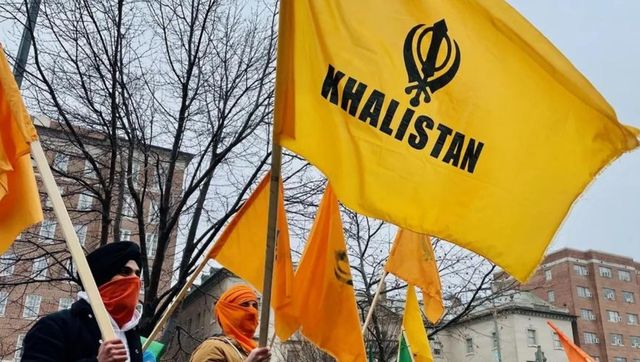The wave of anti-India protests and instances of violent attacks and vandalism on Indian properties and missions abroad — more specifically in the Anglosphere — by pro-Khalistani groups raises a lot of questions. The activities by these extremists across the UK, the US, Australia and Canada appear to be coordinated with a degree of planning and sophistication that suggest a well-oiled machinery at work. The Khalistani movement, which calls for the creation of a separate state for Sikhs by carving out parts of India, is a secessionist campaign that had plagued India in the 1980s but has now become almost exclusively a diaspora-based effort. A report by Washington DC-based Hudson Institute establishes a linkage between Kashmiri separatists and the pro-Khalistani network and points out how these Khalistani groups receive funding, organizational support and military training from Pakistan’s ISI and have ties to militant and terrorist groups in India. The most galling thing is that instead of cracking down on these extremist elements that pose a threat to India’s national security and territorial integrity, foreign governments are often guilty of indifference, benign neglect and even tacit encouragement. The most recent spate of attacks in four countries — the UK, the UK, Australia and Canada — took place last weekend. The synchronized violence on Indian embassies abroad appears to be a reaction to incidents in India where pro-Khalistan leader Amritpal Singh is on the run and his aides have been rounded up by the Punjab Police. In the UK, the Tricolour at the Indian High Commission in London was taken down and glass windows at the embassy building were smashed. Two members of the security staff received injuries in the attack by Khalistani separatists who were reportedly led by a UK-based asylum seeker Avtar Singh Khanda, whose father Kulwant Singh Khukrana was a terrorist of the Khalistan Liberation Force, according to a report in Hindustan Times. Khanda, who had organized the violent protest, has now been arrested, but it appears that despite being alerted by New Delhi that such an incident being organized by a known extremist element, the British intelligence authorities chose to look the other way. Though it is the duty of the host country to provide security to the embassy premises — a sovereign territory — under the Vienna Convention, not a single member of the British security forces, in this case, the Metropolitan Police in London, was to be found anywhere when the violent protest took place. A similar incident took place in San Francisco where pro-Khalistani elements smashed glass doors and windows of the Indian consulate building and installed Khalistani flags on the premises. Reports of more protests came from Canberra. It is difficult to understand the logic behind the culture of indifference that governs these so-called G7 nations that profess to be India’s strategic partners and fellow democracies. Giving anti-India separatists a free run in their land isn’t tolerance for the freedom of expression of extremist elements but a blatant dereliction of duty. It is tantamount to providing encouragement to forces that are inimical to India’s security interests as the Al Qaeda or the Islamic State are to the West. The Khalistani movement was borne out of a grievance narrative that has no takers in India. A major survey by an American non-profit, PEW Research , in 2021, bust the duplicitous narrative of religious tension in India and found out after a face-to-face interview with 30,000 adults that Indians not only value religious tolerance, they are also united in their view about respecting other religions. Members of the Sikh community are as much a part of the mosaic of this multi-faith, multi-ethnic vast nation as the Hindus are, and there exists no tension between Hindus and Sikhs that may create space for any grievance narrative for Khalistani sentiment to spread. That’s why this movement has become just another facet of the proxy war launched against India by Pakistan which tries to keep the embers burning by targeting the Sikh diaspora abroad. If the movement is kept alive, then fomenting separatist insurgency within the borders of India, again, is just a matter of time. The Anglosphere never fails to stress on “values” as a cornerstone of partnership between democracies. What value does Britain or Canada bring to the table when anti-India extremist elements are allowed to routinely run amok and undermine Indian security interests and symbols of sovereignty? If we juxtapose the seriousness of the issue with the ‘light touch’ approach adopted by these nations, it appears that the narrow interests of diaspora-based vote bank politics trump the larger interests of bilateral ties. If that be the case, so be it. They have made a choice. In a sign of India’s new ‘light touch’ approach, barricades that had hitherto been put up in front of the British high commissioner’s residence in New Delhi have now been removed. For far too long, the Anglosphere has run with the hare and hunted with the hounds. Choices have consequences. Read all the Latest News , Trending News , Cricket News , Bollywood News , India News and Entertainment News here. Follow us on Facebook , Twitter and Instagram .
Khalistani movement: For far too long, the Anglosphere has run with the hare and hunted with the hounds
Sreemoy Talukdar
• March 22, 2023, 16:12:42 IST
The most galling thing is that instead of cracking down on these extremist elements that pose a threat to India’s national security and territorial integrity, foreign governments are often guilty of indifference, benign neglect and even tacit encouragement
Advertisement
)
End of Article